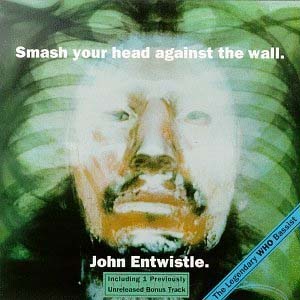I’m more than a little surprised that in a recent poll RTH’s readers and/or contributors declared the 1977 Bee Gees/Peter Frampton vehicle Sgt. Pepper’s Lonely Hearts Club Band to be the worst rock movie, over my preferred choice, Ken Russell’s 1975 film of The Who’s Tommy. Don’t get me wrong – Sgt. Pepper completely deserves its reputation as an utter and complete perversion of everything good and right that The Beatles stood for. But I submit that Tommy is an even worse film and, more importantly for the purposes of this blog, a greater Rock Crime.
Context is everything. Consider that Sgt. Pepper contained precious little input from the actual stewards of The Beatles legacy. Rumor has it that George Harrison and Paul McCartney appear in the star-studded finale, but frankly, if George and Paul are indeed there, they’re overshadowed by rock titans like Carol Channing and Jon “Bowzer” Bauman. Sgt. Pepper’s soundtrack was produced by George Martin, true, but I must remind you that he was not, in fact, a Beatle.
On the other hand, the travesty Tommy features notable work by all four members of The Who. Not only did Roger Daltrey handle the title role, with Keith Moon in the, shall we say, noteworthy role of Uncle Ernie, and not only did John Entwistle lend his distinct bass lines to the enterprise, but Pete Townshend helmed the horrible, horrible soundtrack. Let me tell you: More synthesizer-related Rock Crimes were committed on this soundtrack than at any time in the 1980s.
Let’s also consider who sat in the director’s chair for each film. Sgt. Pepper was helmed by Michael Schultz who, besides having helmed subsequent music-related films like Berry Gordy’s The Last Dragon and Disorderlies, has since moved on to a career directing for television. I’m not calling him a hack per se, but he’s doesn’t seem like an auteur either.
Tommy, on the other hand, was written and directed by Ken Russell, a man who is seldom able to contain himself in realizing his horrible, frightening, gaudy visions on film. That whole artistically dubious glam-camp genre of cinema (Rocky Horror Picture Show, Phantom of the Paradise, the end of All That Jazz) can mostly be blamed on Russell.
But these elements are ultimately only parts of the bigger whole; the main reason Tommy defeats Sgt. Pepper in the badness game. See, everybody knows that Sgt. Pepper sucks, and we can all revel in its badness in the best Mystery Science Theater way. On the other hand, while I know plenty of intelligent people who can tolerate Tommy, the people who truly hate it tend to be Who devotees. This movie is essentially designed to piss off the very people it should be courting first and foremost. Beatles fans can laugh at the folly that is George Burns posing with a white Les Paul in Sgt. Pepper. Who fans can only grit their teeth in pain at the combined memories of Ann-Margret, Oliver Reed, Jack Nicholson, Eric Clapton, Tina Turner, Elton John and every other moment of every other frame of Tommy. I hold Russell and Townshend both directly responsible for this, and you could make a case that the film of Tommy sets the stage for The Who’s many subsequent artistic travesties. Thank God for The Kids Are Alright.


